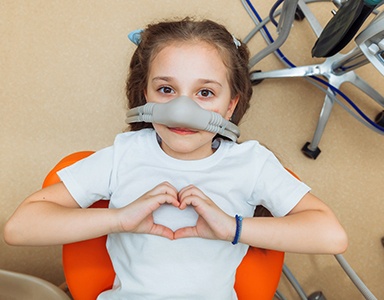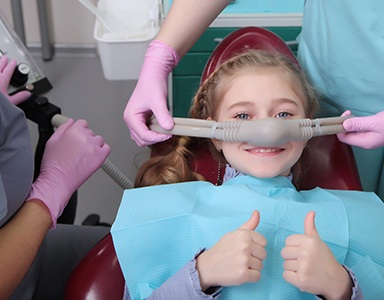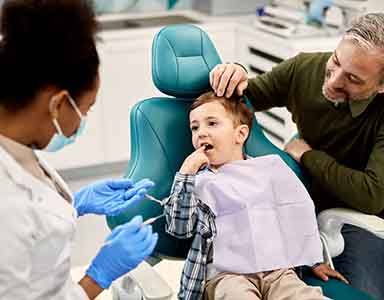Sedation Dentist – Castle Rock, CO
Enjoy Calm, Comfortable Dental Care

Our dentists are trained to help your child get comfortable during dental appointments and work hard to create a pediatric dental office that is warm, welcoming, and accommodating. Of course, we understand that not all children are able to remain calm and still during dental treatments, even basic dental exams and teeth cleanings. If this is the case, sedation dentistry is a viable option worth considering, especially if your child has special needs. Give us a call to learn more about sedation dentistry for children and see if this treatment from our sedation dentist in Castle Rock, CO could benefit your family.
Why Choose Castle Rock Smiles Pediatric Dentistry for Sedation Dentistry?
-
 Nitrous Oxide and Oral
Nitrous Oxide and Oral
Conscious Sedation Available -
 General Anesthesia (Sleep Dentistry)
General Anesthesia (Sleep Dentistry)
for Severe Anxiety -
 We Accommodate Children
We Accommodate Children
with Special Needs
Nitrous Oxide Sedation

Nitrous oxide, also known as "laughing gas" is used to help relax children with mild to moderate anxiety regarding dental work or the dental office. Nitrous oxide is delivered through a small mask placed over the child's nose. The effects of nitrous oxide help children to relax so they can receive their dental treatment calmly and safely. Nitrous oxide is recognized by the American Academy of Pediatric Dentistry as a safe and effective technique to use for treating children's dental needs. The gas is non-addictive and is eliminated from the body within a few minutes after it is turned off. While inhaling nitrous oxide, your child will remain awake and able to interact with the dental team.
Who Is a Good Candidate for Nitrous Oxide?

Sedation dentistry is a great option for kids who feel uncomfortable in the dental office for one reason or another. Nitrous oxide sedation is usually recommended for kids with:
- Dental anxiety
- Fear of needles
- Tooth sensitivity
- Difficulty sitting still
- Resistance to local anesthetics
If any of these things apply to your child, or there is another reason why you think they could benefit from nitrous oxide sedation, don’t hesitate to let us know.
How Does Nitrous Oxide Work?

Before your child’s treatment, we will administer the nitrous oxide through a small mask that is placed over their nose. We will adjust the flow of oxygen and nitrous oxide gas, which is clear and odorless, throughout the treatment. After just a few minutes of breathing normally, your child will feel perfectly relaxed and uncomfortable.
Once the full effects of the nitrous oxide kick in, we will begin their treatment. After we are complete, we will remove the mask and turn off the gas. Just as quickly as they feel the effects, they will feel back to normal again.
Aftercare for Nitrous Oxide

The effects of nitrous oxide don’t linger. The gas wears off very quickly, so it is unlikely to cause residual side effects. Some children may experience fatigue and nausea, but this should go away relatively quickly after the gas is turned off.
Oral Conscious Sedation

For children who are very young, apprehensive, or have extensive treatment needs, conscious sedation may be necessary. We will give your child an oral medication that will help calm them and minimize the anxiety or discomfort associated with dental treatment. Conscious sedation is intended to make your child drowsy, and possibly even fall asleep, but they will most likely stay awake. The dentist will help determine which medication will be best for your child's unique treatment needs.
What is Oral Conscious Sedation?

Oral conscious sedation is typically one of a few anti-anxiety medications that is given in the form of a pill or liquid. We’ll discuss your child’s medical history and any other medications they are taking so we are sure to choose one that is the safest and most effective. All in all, it enables a young patient to feel more relaxed in the chair while also allowing our team to work efficiently.
How Does Oral Conscious Sedation Work?

Prior to your child’s appointment:
- Your child will need to have a physical exam completed by their pediatrician.
- Inform the dentist of any medical conditions your child may have.
- Inform the dentist of any medications (prescription, over-the-counter, and/or herbal) that your child is taking.
- Your child should not have anything to eat or drink for 6 hours before their sedation appointment.
After their sedation appointment:
- Your child may be drowsy and will be monitored until they are ready to be dismissed.
- If your child would like to sleep, place them on their side.
- Your child may begin eating/drinking immediately after treatment. In order to prevent nausea and dehydration, begin with small sips of clear liquids. Slowly progress to a soft diet throughout the day. The first meal should be light and easily digestible.
- Please monitor your child closely to avoid lip, cheek, or tongue biting in areas that are numb from local anesthesia.
- Please call our dental office if you have any questions or concerns about your child.
Is Your Child a Good Candidate for Oral Conscious Sedation?

We often recommend oral conscious sedation for children who:
- Have moderate to severe dental anxiety
- Have issues sitting still for extended periods
- Have a sensitive gag reflex
- Have behavioral issues that make them difficult to control
- Don’t respond to regular dental anesthetics
- Need to have complex/multiple procedures completed
- Have previous negative dental experiences
Our team will be happy to go over all of our comfort and sedation options so that you can make an informed and confident decision about your child’s care.
General Anesthesia

General Anesthesia may be recommended for very apprehensive children, very young children, children with extensive dental needs, children who are extremely uncooperative, or children with special healthcare needs. General Anesthesia is performed only in a hospital or outpatient surgical center. Your child will be completely asleep and unaware of the dental treatment that is taking place. General Anesthesia is also used for children having tonsils and/or adenoids removed, or ear tubes placed.
While there is some risk associated with general anesthesia, when administered by appropriately trained individuals in an appropriate facility, it is safe and effective. Trained personnel will monitor your child closely to ensure their safety throughout the procedure and manage any complications.
We will discuss the risks and benefits of general anesthesia and why it is recommended for your child. Dr. Benzley is affiliated with The Children's Hospital and can schedule your patient to be treated at the main facility in Aurora or the South Surgical Center in Lone Tree.
Sedation Dentistry Frequently Asked Questions
At Castle Rock Smiles Pediatric Dentistry, we can help your little one overcome their fear of the dentist and enjoy calm, comfortable dental care. As always, we want you to feel 100% confident with any treatment you choose. If you have any questions or concerns, we’re just a phone call away to put your mind at ease. For your convenience, we’ve gathered some of the most common questions we get about sedation dentistry we get below so you can learn more.
Is Sedation Dentistry Safe for Children?
When administered by a highly trained Castle Rock sedation dentist like Dr. Benzley, sedation dentistry is extremely safe. Both the American Academy of Pediatrics and the American Academy of Pediatric Dentistry recognize professionally administered sedation dentistry as a safe and effective technique to reduce anxiety and discomfort in children during dental procedures. We’ve used these methods to successfully help children of all ages stay comfortable while they get the dental treatments they need.
Will My Child Feel Anything During Their Treatment with Sedation Dentistry?
With sedation dentistry, your little one should be unaware of any of the sights, sounds, smells, or feelings that typically cause them distress. It’s unlikely that they’ll feel any discomfort at all during their treatment. They may feel some slight pressure in their mouth every now and again as we work, but their mouth will be thoroughly numbed with a local anesthetic to prevent pain.
Will Sedation Dentistry Put My Child to Sleep?
It’s not uncommon for children to be so relaxed with sedation dentistry that they fall asleep during their treatment. However, sedation dentistry does not put patients “to sleep” or cause them to lose consciousness. Should your little one drift off, they can be easily awakened at any time. For a majority of the time, they will be conscious enough to respond to our basic instructions. Afterwards, your child may not remember anything about their appointment.
How Long Do the Effects of Sedation Dentistry Last?
Nitrous oxide sedation, the lightest form of sedation dentistry, is well-known for how quickly it works and wears off. Within moments of inhaling the colorless, odorless gas via a small mask placed over the nose, your child will begin to feel light, relaxed, and maybe even a little giggly. Once the treatment is complete, the mask will be removed and your little one will return to their normal state of consciousness right away. They should be able to get back to the rest of their day without interruption!
Is Sedation Dentistry Right for My Child?
As long as your child is healthy, there’s a good chance that sedation dentistry is a good option for them. However, the only way to be sure is to come visit us for a consultation. Dr. Benzley will take the time to have a discussion with you (and your little one) about your expectations and concerns, then review your child’s medical history. He’ll ensure that sedation is a safe choice for your child and help you pick the option that best suits their needs.







